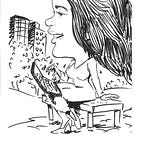The Story of the First Black Woman to Own a Bank
Maggie L. Walker was the first African American woman to charter a bank in 1903 and serve as its president
Strolling through Jackson Ward, the historic district in Richmond, Virginia once known as the “Harlem of the South,” it seems every building, every block, is steeped in African American history, culture, and pride.
I’d first visited this community before the global pandemic shutdowns and collective loss. Established by free and formerly enslaved Black people shortly after the Civil War, it was one of the most prosperous African American enclaves at the turn of the 20th Century. Following a period of decline, there’s renewed energy, revitalization.
On Second Street, the restored Hippodrome Theater is where entertainment legends from Ella Fitzgerald to James Brown performed. Near a busy intersection stands a gleaming statue of Bill “Bojangles” Robinson, the vaudeville tap dancer and classic Hollywood film star, who is a native son of the city. In every direction are Black-owned restaurants, shops, and colorful murals.
Crossing over to East Leigh Street, a sidewalk banner caught my eye. An oversized vintage photograph showed an alabaster-hued, statuesque “sista” from the early 20th century, dripping in fur and jewelry. Impeccably groomed in a tailored floor-length dress, a feather plumed hat rested jauntily upon her upswept curls. She oozed wealth, status. Her gaze was dignified, self-assured. “Wow,” I marveled. “Who could this be?”
That moment marked my introduction to the magnificent Maggie Lena Walker. In 1903 — notably 17 years before women obtained the right to vote — she founded the St. Luke Penny Savings Bank, becoming the first African American woman in U.S. history to charter a bank and serve as its president.
“Let us put our money together; let us use our money; let us put our money out at usury among ourselves, and reap the benefit ourselves,” Walker said in a 1901 speech. “Let us have a bank that will take the nickels and turn them into dollars.”
